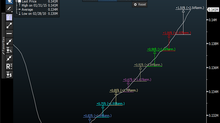The Folly of the Econs
I've been reading Richard Thaler's book “Misbehaving,” which is about his observations on Behavioral Finance. For an economics book, it's quite entertaining, because everyone can recognize themselves and their sometimes irrational purchasing and financial decisions. So it's selling well for a book of this kind, and Professor Thaler's cheerful spirit makes him a good interview candidate.
A simple example: shoppers go to an electronics store to buy a clock radio. The price is $49.95, but a salesperson tells the customers the exact same unit is on sale for just $39.95 at another store branch down the road. Most people will wish to take advantage of the low price and go to the other store. After all, that's quite a discount.
Later, the same customers are at the same store who wish to buy a large flat screen television that retails for $495.00. The salesperson tells them the same set is available at the other store down the road for $485.00. Despite the identical savings of $10, no one bothers to go to the other store. That's just not enough of an incentive to them when that kind of money is tied up in the purchase. Car sales and marketing people know this, so they lard up the price of a vehicle with options. You'll sneeze at a “mere” $1000 in this setting, but object wildly for other purchases.
Thaler's point is that people can act in ways that are not entirely rational to the people he calls the “Econs.” Those are the analysts and wonks whose lives are consumed with data, as opposed to what he calls the “Humans,” ordinary people who don't act the way the "Econs" think they should. And one reason for it is that all the modeling in the world can't account for the vagaries of human behavior, the psychology that Humans apply to money, and the value they place on their possessions.
What brought this commentary up – to my never ending amusement- was my earlier piece back in January on the Econs' universal belief that the sudden drop in gas prices last year should have launched a windfall for retail sales. To hear them tell it, hordes of shoppers driving rusted, 30 year old pick up trucks would practically cram the parking lots of the nearest Neiman Marcus, with fistfuls of cash. However, as I pointed out, those who would notice the extra money were far too economically abused to do any meaningful consumption with their savings, and for those who could already afford to routinely fill their Chevy Tahoes with $90 fill ups, it wasn't going to alter their consumption patterns one whit. We all got a chuckle seeing that gasoline tab well under what we're used to, but at the same time, we weren't thinking about blowing the savings on something we wouldn't normally buy anyway.
But there was one consumption pattern that was clearly altered by the drop in the price of gasoline. Know what happens when you drop the price of gasoline? Simple: People just buy more gasoline! And no one predicted this. Hundreds of Wall Street analysts, brimming with experience and education, plus millions in analytical tools and research, all of this firepower, and everyone missed the result. And even after all these months of savings, the American consumer continues to deleverage. But that begged the question: Just what led to this synaptic, knee jerk assumption of higher retail sales in the face of lower gas prices?
On page 94 of the book, Thaler just nails it to the door:
“Exponential discounting just had to be the right model of intertemporal choice because Econs would not keep changing their minds, and the world they studied no longer contained any Humans. This theory induced blindness now strikes everyone who receives a PhD in economics. The economics training the students receive provides enormous insight into the behavior of Econs, but at the expense of losing common ground sense intuition about human nature and social interactions.Graduates no longer realize that they live in a world populated by Humans.”
Which is the same point I made in my January 15, 2015 piece, “Keynes on Scholasticism.” Nothing has changed since the Master called it in 1933, despite the massive arsenal of analytical tools we have in the 21st century. Without the Human component, all of the predictive metrics the Econs have devised, are worthless.
What I believe drove this particular bad call, was the fact that American economics has been adulterated by a flawed narrative, and for the Econs, that narrative is that there is an iron law of an inverse correlation to taxes and personal spending. Time after time, interview after interview, the Econs couldn't stop themselves from equating the drop in gas prices to a tax cut, for which they have been repeatedly taught- despite a complete lack of empirical evidence- that tax cuts automatically spur consumption. They don't, and the the fantastic intellectual conceit deployed by the Econs here is that the “Humans,” left to themselves, have no other option than to use their money to indulge themselves on some additional trinkets just because a savings of some small amount dropped in their lap. This is what is meant by the "intertemporal choice"- the options people weigh between immediate gratification and future utility. And the only way someone comes to that conclusion is by ignoring the real world. A world, as Thaler said, merely “populated by Humans.”
Interestingly enough is that Keynes himself, if he were alive today, may have been tempted to subscribe to the Econs belief: a component of Keynesian Theory is something called the "Marginal Propensity to Consume" or MPC, and it posits the belief that people with less income will be more likely to spend a higher percentage of any additional income that comes their way, simply because they have more needs to satisfy than the already sated wealthy, who are more likely to save or invest it. But this component of Keynes' General Theory, I believe, takes on a different meaning in modern times. For one, people aren't quite so desperate to consume beyond basic needs, and are more likely to husband their resources. And that leads us to this realization:
Throughout history, there have been events that have placed societies on whole new trajectories, as if suddenly knocking it off course. The Crash of 1929 was one such event, Pearl Harbor another. JFK's assassination, the Fall of the Berlin Wall, September 11th, and for the purpose of providing a useful fulcrum, the fall of Lehman Brothers on September 15, 2008. This last event, I believe, has fundamentally altered the psychology of the American consumer ethos, and the relationship of the economy and employment stability to the average person has, at least for the foreseeable future, evolved into a new place, one of negativity, suspicion and fear.
The Econs are not going to see that. Because "theories" aren't "truths." And "models" aren't "real."













